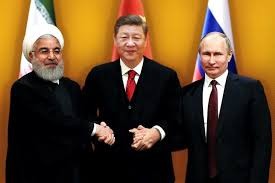Sept. 1—Dmitry Polyanskiy, the Chargé d’Affaires of Russia’s UN Mission, denounced the E3 decision for a snapback of sanctions on Iran to reporters at the UN Aug. 28. He announced that Russia and China put “into blue” a draft Security Council resolution (during the final stage of the drafting process, a draft resolution is printed in blue ink) which will extend the UNSC resolution 2231 for six months and which “Urges all initial participants of the JCPOA to immediately resume negotiations on the matters related to the resolution 2231 and the JCPOA.”
“Now the world is at a crossroads,” Polyanskiy said. “It’s quite clear. One option is peace, diplomacy, goodwill, normal human contact. Another option is a kind of diplomacy at the barrel of the gun, hence extortion and blackmail, and all other things. The second option is clearly represented by the action that was triggered today by France, the U.K. and Germany.” He added that “this move by the European countries, in our view, has absolutely no legal bearing, because they were not implementing resolution 2231 in good faith.”
The E3 action “will affect the overall climate over the issues related to the Iranian nuclear program,” Polyanskiy continued. "It will complicate international cooperation in this regard. Thus, we think that the option proposed by Russia and China today is the way that everybody should follow in order to avoid complications, in order to avoid serious problems for international peace and security, in order to give some chance and breathing space for diplomacy.
“So once again, we believe that the move by the E3 cannot and should not entail any legal or procedural effect. It’s a mere escalatory step. It’s something that is absolutely showing that the Western countries do not know what diplomacy is about. They don’t care about diplomacy. They care only about blackmail, threats and coercion vis-à-vis independent countries.”
Later, Polyanskiy reminded the reporters (who seemed to have forgotten) that Iran made the decision to enrich uranium to 60% purity in response to the 2018 U.S. withdrawal from the JCPOA. “The United States abandoned the JCPOA, and since then the situation started deteriorating. So, we should not confuse the real source of the problem, which is what happened in 2018,” he said. “Also, we shouldn’t forget about the context of absolutely unlawful strikes that were conducted against the Islamic Republic of Iran in June by Israel and then by the United States, including against the objects that are placed under the IAEA safeguards. This was, and still is, a serious breach of international law.”
In Beijing, Chinese Foreign Ministry spokesman Guo Jiakun’s characterized the E3 move as unconstructive, and called for settling problems “through political and diplomatic means.”




